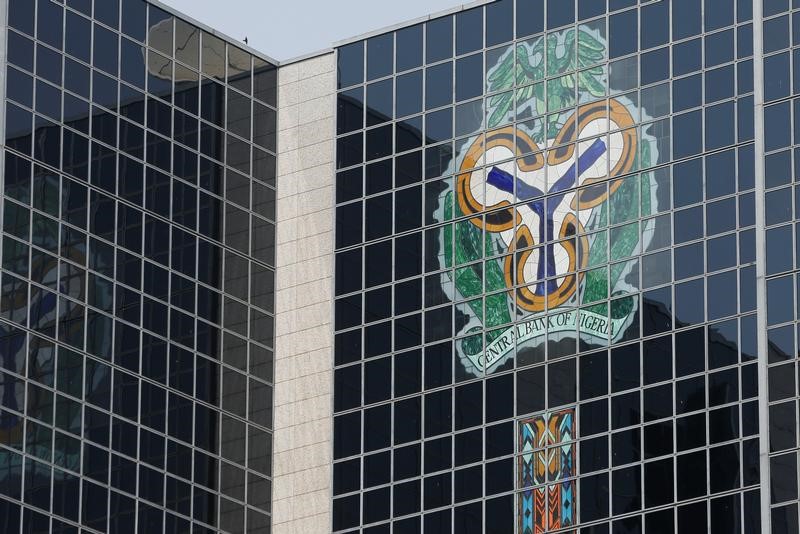Nebius secures multi-year AI infrastructure deal with Microsoft
* Fitch predicts 20% hit to Nigerian bank revenues this year
* Central bank measures exacerbate lending, FX shortage woes
* Economy faces COVID-19, oil price shock double whammy
By Chijioke Ohuocha and Karin Strohecker
ABUJA/LONDON, July 28 (Reuters) - Nigeria's banks are
expected to take a big hit to revenues and face rising borrowing
costs this year as central bank measures to support the naira
currency squeeze lenders already hit by fallout from coronavirus
and the oil price shock, analysts say.
Banks in Africa's largest economy - a mainstay for equity
and fixed income frontier market investors - have learned to
navigate challenges in a country that has long struggled with
dollar shortages and multiple exchange rates.
But the prospect of anaemic growth, dwindling oil revenues,
declining remittances and dollar shortages exacerbated by the
central bank's latest action aimed at curbing naira liquidity
and currency speculation are putting pressure on lending by
banks and the quality of existing assets.
The central bank has sucked as much as 900 billion naira out
of the local banking system since raising the cash reserve ratio
(CRR) by 5% to 27.5% in January, according to analysts'
calculations.
"General sentiment in the markets is that CRR debits are
carried out quite close to FX auctions to prevent the banks from
presenting large ticket FX demands at auctions," said Nkemdilim
Nwadialor at Tellimer Capital.
Those debits also hamper wider lending, going against
central bank measures of lowering banks' loan to deposit ratios,
she said. Central bank data showed credit to the private sector
in April dropped by nearly two-thirds from end-2019.
"Banks are dealing with slow growth, fall in lending, a lack
of forex in the market and asset quality issues," said Mahin
Dissanayake, senior director EMEA bank ratings at Fitch.
He expects banks' revenues to drop at least 20% this year,
though he did not expect any to make a loss.
Some banks have already indicated they expect a hit. In
April, mid-tier lender Fidelity Bank FIDELIT.LG warned 2020
profits would drop by 15%.
Bankers said lenders were relying on existing customers to
weather the storm as new lending looked risky with the economy
expected to tip back into recession.
Fitch predicts impaired loan ratios will rise sharply in
2020 with Nigerian banks the most exposed to stress in the oil
sector compared to their peers in emerging markets elsewhere.
Nwadialor at Tellimer expected a "significant pick-up" of
non-performing loan ratios from 6.6% in the first quarter to an
average of 10% for the full year - double the central bank's
benchmark.
Some banks have already announced plans to tackle this.
Mid-tier lender FCMB FCMB.LG plans to complete a restructuring
of half its loan book at the end of April. A central bank policy
maker predicted last month that banks would restructure over a
third of loans. Moody's warned in a note that dollar shortages would
intensify over the next 12-18 months - a period when 49% of
banks' $7 billion foreign-currency borrowing matures, leaving
them vulnerable.
Yields on dollar bonds issued by Nigerian banks - a proxy
for borrowing costs - have retreated from the peaks scaled in
the midst of the oil and coronavirus rout. Yet for lenders such
as Zenith Bank ZENITHB.LG , Fidelity Bank FIDELIT.LG or
Access Bank ACCESS.LG , the yields are still at least double
the level from mid-March.
"Foreign currency borrowing will be more expensive at a time
when banks must refinance almost half of their borrowings,"
Moody's analysts said.
<^^^^^^^^^^^^^^^^^^^^^^^^^^^^^^^^^^^^^^^^^^^^^^^^^^^^^^^^^^^
Nigerian banks underperform https://tmsnrt.rs/2EmbFHb
Nigeria's economy - tethered to crude https://tmsnrt.rs/3hIa9gX
Nigerian banks foreign borrowing https://tmsnrt.rs/30O2bw4
^^^^^^^^^^^^^^^^^^^^^^^^^^^^^^^^^^^^^^^^^^^^^^^^^^^^^^^^^^^>
